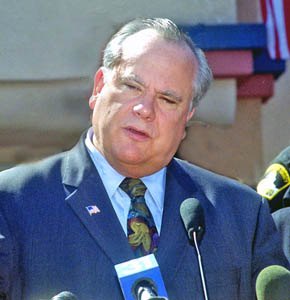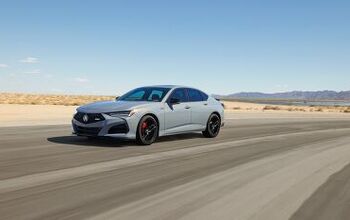California AG Sues Toyota, GM, Ford, Chrysler, Honda and Nissan
I remember reading about an environmental group that argued for zero population. Not zero population growth, zero people. They figured there was only one way to return nature to its, um, natural state: take humans out of the equation. I don’t recall their plan to achieve this goal, but I don’t think it involved automobiles. After all: no people, no cars, no pollution. Done. California’s tree huggers may not adhere to the same logical extreme, but c’mon, can someone please knock some sense into the state’s eco-warriors before they do something really stupid?
Yesterday, California Attorney General Bill Lockyer filed a lawsuit against Toyota, General Motors, Ford, Chrysler, Honda and Nissan. The suit alleges that these companies’ vehicles damaged the ozone layer hovering over California. The People seek unspecified financial damages for the diminution of the state’s snow packs, beaches, ozone layer and endangered animals. Clearly, The Golden State has kicked their anti-car agenda back into high gear.
Now we could ignore the political grandstanding that triggered this eminently dismissible lawsuit (they followed all your environmental regulations and you’re suing them?) and get into a debate about whether or not carbon dioxide is an environmental hazard. But let’s just assume it is. Is treating law-abiding automakers like criminals really the best way to sort out their products’ environmental impact? It’s like a bunch of social workers suing the Attorney General’s office for not forcing the legislature to pass more stringent laws against pedophiles, so they could enforce them.
Of course, there are plenty of people who assume that automobile manufacturers are criminals. The movie “Who Killed the Electric Car” reflects the generally held belief that automakers are deeply, fundamentally corrupt organizations who will gladly sacrifice “the public good” for their shareholder’s gain. They’ll rip up mass transit lines, pretend they can’t build cars that get 100 miles to a gallon, subvert safety and environmental regulations, send jobs abroad, lie, cheat and steal— anything to avoid doing the “right thing.” The logical corollary: the carmakers’ [alleged] foot-dragging must be stopped at any and all costs.
Never mind that these same critics drive cars. Never mind that the society in which they live depends on the automobile for its social, economic and genetic well-being. Never mind that automakers have eliminated virtually all of their products’ harmful pollutants AND increased their fuel efficiency AND increased passenger safety AND maintained the finished products’ affordability AND generated billions in annual tax revenue AND created tens of thousands of skilled and unskilled jobs. Automakers– and automobiles– are the enemy within.
If you want to know where this is heading, look at England. In the name of public health, London hits-up motorists entering the city center with a “congestion charge." In the name of public health, large public areas have been pedestrianized and the number of public parking spaces reduced. In the name of public health, the government levies astronomical taxes on petrol, cars and car licenses. In the name of public health, the government dictates the number of houses that can be built, the number of parking spaces those houses can provide and the location of those houses (to minimize car use and maximize the use of public transportation).
Maybe you’re OK with all that. But the results aren’t exactly as intended. Car use (i.e. “pollution”) has continued to increase. Meanwhile, the country’s public transportation system has become extremely over-crowded (in addition to dirty, unreliable and expensive). Urban congestion (and jobs) has been exported to outlying areas. Decent, affordable housing for middle class buyers is practically non-existent. And speaking of class, motoring’s prohibitive expense puts automotive ownership completely out of reach for lower income workers and lowers the standard of living for the middle class. This situation does nothing to alleviate class resentment, and much to increase it.
And that’s the single biggest issue facing those who would seek to limit America’s automotive “addiction”— whether they know it or not. The automobile is, literally, social mobility. Cars are the platelets in the body politic. By keeping cars and car ownership relatively cheap, our populace can feed outlying areas with employment and business, spreading economic well-being both socially and geographically. Of course, detractors would argue that our cars are also spreading pollution and environmental destruction further and faster, but they’re missing the point.
Politics is supposed to be the art of compromise. If you view the car as a planet-killing demon and move to restrict its use, or try to tax it to death, or regulate it into a corner, success will evoke the law of unintended consequences. Greenhouse gasses may be a threat to our children’s future, but there are other threats we should also consider before we take drastic steps to “solve” the problem. Perhaps California should work with automakers, rather than against them.
More by Robert Farago
Latest Car Reviews
Read moreLatest Product Reviews
Read moreRecent Comments
- Tassos Good Used Classic Car. Price is right too.
- Fred Just as everyone agrees that Tesla chargers for everyone, he quits.
- Golden2husky Seems like a poor business move - Tesla could basically control most of the charging network in the US for the foreseeable future. Something is short circuiting in Musk's brain. Maybe too much Orange Kool-aid. Or he is also in love with a pigeon. Regardless this is bad news for sure.
- Tassos The manager of the massage parlour I frequent drives one of these. She won’t acknowledge my presence though, despite me being there 3 times a week. I guess I’m lucky they even let me back there after the camera incident. I HAD NO IDEA MY PHONE WAS RECORDING!
- Oberkanone I'm fan of Celica 1985-2006. 1976 I don't care.


































Comments
Join the conversation
jonny- "Anyhow, any legislator who does anything car-related in California besides fixing the 405/101 interchange, the 110 through downtown, double-decking the 10 and the 101, widening the 405 by 54 lanes to the airport, getting semis off the 710 and constructing a duplicate of the Bay Bridge in SF/Oakland, should be convicted of treason and shot." well said. but as i am sure you know. the govenator and mayor both dont want anymore freeway construction. except the 710-210 deal. what a great place...
The entire free world needs to sue California for not having fallen off into the Pacific yet. Is there anything we can do to expedite the process?